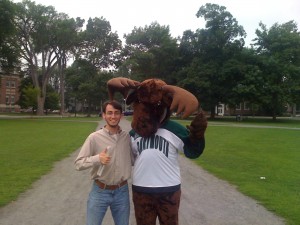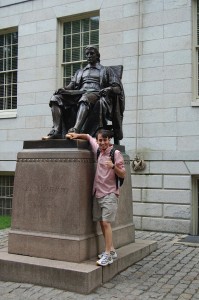By Henry Loehr ’13
HANOVER, NH–This has been a busy summer for me as a Hampden-Sydney student. I went to Argentina to study Spanish during May Term. When I got back to the States, I had my wisdom teeth taken out. As soon as I healed, I was off to Hanover, New Hampshire for an entire month of biology research with Dr. Mike Wolyniak, my genetics professor last spring. During the school year, I discussed with Dr. Wolyniak the possibility of doing genetics research over the summer. Dr. Wolyniak was kind enough to work with me in developing a plan that would allow me to do both. I would accompany him to Hanover, New Hampshire and work in a lab at Dartmouth Medical School during the month of July. I eagerly accepted this amazing opportunity.
I enjoy travel and Hanover has not disappointed. The small town atmosphere coupled with the energy of a college town charmed me immediately. There are plenty of different places to eat, shop, or just sit and read. The town is a haven for anyone who enjoys outdoor activities such as canoeing, hiking, (in my case) running, or fishing.
My average day starts with cross country training in the morning, to avoid the heat of the afternoon, before I go into work at nine. That being said, the weather while I have been here in the Upper Valley of New Hampshire has been absolutely superb. The temperature is a cool 85˚F when I get out of the lab. During the afternoons I spend my free time exploring Dartmouth’s expansive and beautiful campus, listening to live music, or reading outside and enjoying the (cooler than Virginia’s) summer weather.
My work is on Arabidopsis thaliana, a small plant used as a model organism for genetic study. My job is to extract the DNA from leaf samples of plants. I prepare this DNA for a polymerase chain reaction (PCR). After the reaction is complete, the DNA is loaded and pulled through an agarose gel with an electric current. This project is part of a larger project that I will continue this upcoming school yea to help understand the genetics of this model plant. Three other schools (Barnard College, College of Charleston, and the University of Georgia) are also working on this joint research venture.


